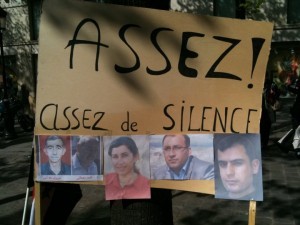Politics on Facebook still scares Syrians


SMN No. 9, September 8, 2010
The Facebook social network has become the favoured virtual space for many young Syrians to rally support for many common causes. But according to a cyber-activist, who asked to remain anonymous, the activities of youth over Facebook mostly concern social, cultural or literary issues.
The cyber-activist noted that these “safe” topics, unlikely to cause any problems with the authorities, were more popular than initiatives with political and civil rights aims.
He said that this trend reflected the reality of Syrian civil society, where it remains very risky for youths to publicly venture into any form of political activity outside the frame of the ruling Baath party because of the repression of the authorities.
The Syrian cyber-activist, who has created many successful Facebook groups, said that unlike countries such as Egypt where thousands join political groups, Syrian youth are afraid of overt involvement in politics on the net.
He said that Syrian political groups attracted a relatively small number of members, mostly Syrian expatriates. These groups generally focus on the call for the abolishment of the emergency law, which has been in effect since 1963, on demanding more public freedoms and the release of prisoners of conscience.
He added that these groups also used a straightforward, aggressive attitude against the regime as well as a confessional tone, which discouraged many Syrians from joining them.
Nevertheless, Facebook, which remains officially blocked in Syria, has allowed young Syrians to attract the public’s attention to a number of issues that affect their everyday lives, like the rise in mobile phone bills and the controversial draft of the new personal status code.
In the absence of any possibility for Syrians to create real forums of discussion or pressure groups, the internet has become a potent alternative environment with some groups on Facebook attracting thousands of Syrian “netizens”.
During the past year, Syrian cyber-activits claimed they had been successful in pushing officials to lower the tariffs of mobile phones and in lobbying the government to withdraw from discussing the draft of a new code on marriage and divorce, one which many civil rights groups considered archaic.
The cyber-activist said, however, that Syrian netizens were still not capable of fully capitalising on their successes.
He said that for cyber-campaigns to become more effective and lead to more concrete results, there should be better coordination should take place between cyber-activists and the media.
